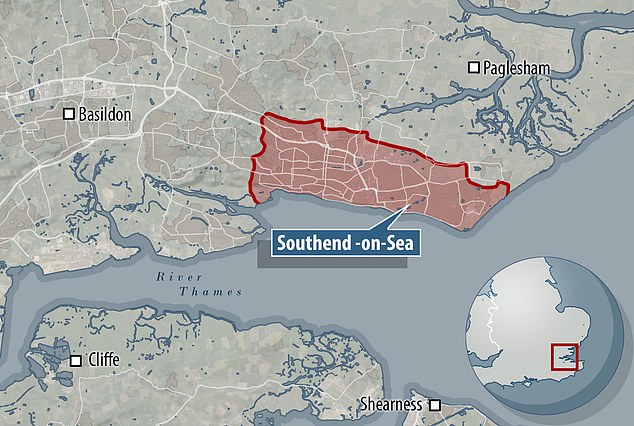Health officials are urgently trying to track down 200 people and give them the MMR jab amid fears of a measles outbreak in Essex
- Health officials said eight people are suspected to have measles
- They all attended a day service for learning difficulties in Southend-on-Sea
- The centre has closed for the rest of the week as a precaution
Up to 200 people in Essex are being tracked down to receive a vaccination after a suspected outbreak of measles.
Eight people are understood to be affected by the highly contagious infection – but none of the cases have been confirmed.
All of the suspected cases attended a day service in Southend-on-Sea for people with learning difficulties.
Southend Care has now shut for the rest of the week, along with other unnamed centres in the area, in order to prevent cases spreading.

Hundreds of people in Essex are being tracked down to receive a vaccination after a suspected outbreak of measles in Southend-on-Sea
Southend council bosses are liaising with Public Health England (PHE) to identify anyone who has been in contact with the eight suspected patients.
They will be offered the MMR vaccination, if they are not immunised already, as an ‘immediate priority’.
Measles is highly contagious, spread by coughing and sneezing. If left untreated, it can lead to serious complications.
A Southend Council spokesman said: ‘Collectively, we are adopting a precautionary approach to this situation to help interrupt any potential further spread.
‘As an immediate priority, and alongside our colleagues at the CCG and Southend Care, we are identifying and contacting those people who may have been directly exposed and are offering those people MMR vaccinations if they are not already immunised.
‘At this time, we expect this offer will be made to approximately 200 people.’
Dr Smita Kapadia, consultant in communicable disease control at PHE, said: ‘Measles is a very infectious virus and can spread rapidly among communities if people have not been fully immunised.
‘While most people who catch measles will recover completely within a couple of weeks, it’s important to remember measles can be a very serious illness that can leave permanent disability, and occasionally even kill.
‘The best way to prevent measles is through vaccination. If you are unsure about yourself or loved ones, check with your GP.’
Coverage of the MMR jab, which protects against measles, mumps and rubella, fell for the fifth year in a row last year.
Children and young adults should receive two doses of the MMR vaccine for maximum protection. The target figure is 95 per cent.
But just 87 per cent of children in England are receiving their second dose of MMR, 92 per cent in Wales and Scotland, and 91 per cent in Northern Ireland.
Public Health England estimated that one in seven five-year-olds started school this year without being vaccinated against measles.
Britain was declared ‘measles free’ by the World Health Organisation in 2016 after a 36-month period with no ‘endemic’ transmission – meaning the only outbreaks in that time had started abroad and were then passed on.
But after a spike in cases, and because uptake of the MMR jab has fallen year on year, the WHO revoked the measles-free status this year.
There were more than 230 cases across England during the first quarter of 2019, and 301 in the second quarter.
Studies have found that concerns over an autism link are the main reason parents avoid giving their child the vaccine.
A bogus study claimed the MMR vaccine can lead to autism in the year 1998, but the findings were never proven.
Dr Kapadia said: ‘If you think you could have measles, it’s also really important to stay away from areas where you could come into contact with lots of other people -especially from vulnerable patients in hospitals, care homes or other settings.
‘Measles can be serious for these groups and spreads easily in these places.’
